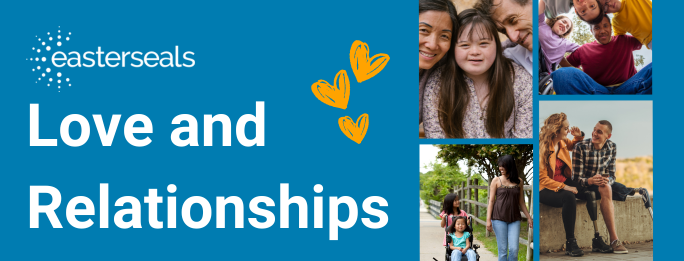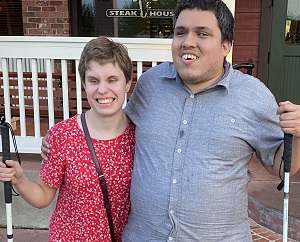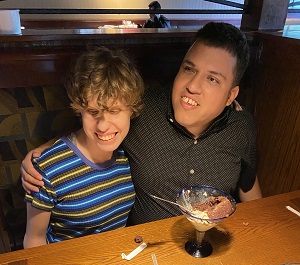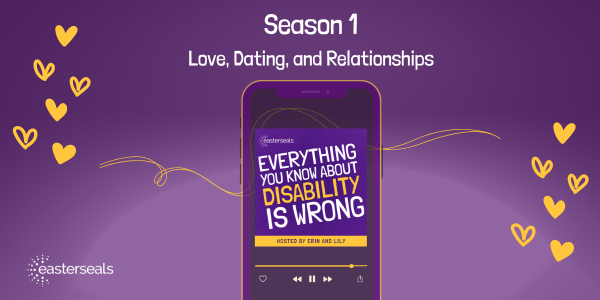Access and Inclusion: Acts of Love in the Disability Community
by Alicia

By Alicia Krage
Since moving in with my boyfriend last year, I’ve thought a lot about the various ways I can show love, especially around this time of year. We’re often thinking about love this month as Valentine’s Day approaches.
I’ve learned that showing love, especially in a relationship, could mean accommodating your partner’s disability, or learning how your disability coincides with your relationship. It’s important to create a space of acceptance and inclusion while also addressing the other person’s access needs. It’s in these simple acts that I feel show the most love because it addresses that, yes, we are both blind, but this doesn’t have to be a defining factor — as people or as part of our relationship. This comes into play when planning trips, too. For example, Juan and I are taking a trip to San Antonio in a few months and, while it’s not a far trip, it’s our first solo trip together. This means making accessible travel plans, as well as researching accessible touristy activities we can do. Juan is really into artsy things, so we’re looking into tactile art museums that we’d be able to enjoy. I think dating with a disability allows us all to become open minded about different ways of doing things and different accommodations that can be made.

Alicia and her partner, Juan
This could apply to platonic relationships as well, which is something I’ve thought about immensely since relocating from Chicago to Houston. I remember a conversation I had with my mom on my last night in my hometown. She asked me what I was most nervous about, and the answer came easily: “Making friends. Because making friends as an adult is hard.” Almost a year later, I realize that wasn’t anything I needed to worry about.
Aside from the friends I’d made during previous visits, I only have a few new friends here, but that’s okay. I like my circle small.
I met my closest friend Desiree at a book club. I found it on Facebook, actually, because how else do people meet outside of college or work? I didn’t know. She posted asking if anyone was interested in joining one, so I responded. We messaged here and there and swapped numbers. Closer to the date of the first meeting, I told her that I’m blind and please look out for me during the first meeting because I wouldn’t know where to find anyone. Unphased, she said, “Absolutely! I’ll help in any way I can!”
Since then, our friendship grew outside of book club and evolved into constant texting, exchanging book recommendations and exploring various local coffee shops and going out for the occasional brunch. I know it seems trivial to say, but I’ve never felt like “her blind friend.” I’m just her friend who needs help sometimes. She’ll let me know what type of place we’re going to — if you just walk up to the counter and order or if it’s a sit-down place — in case I arrive first. If we’re going out for a meal, she’ll always ask if I need her to read me the menu. When I went to her house the weekend before Valentine’s Day for a “Galentine’s Day” get-together, we played games, but they were simple enough that I could definitely participate. I constantly feel loved in our friendship because she has always provided me a space to be myself, to advocate for my needs without feeling like I’m asking for too much, and meeting my access needs.
My family has always been good at this, too. It’s in the way they adapt card games if necessary, or plan accessible activities during family vacations. They also recently started activating audio description when we watch TV shows or movies. My mom always said that the people audio describing know what information is important, so it’s better to have that feature turned on. I felt weird about it at first because I thought it would annoy them and it would be hard for them to tune out. But they assured me several times that they didn’t mind. And so that’s how we’ve been doing things.
 I’m fortunate to feel so loved in all of my relationships — romantic, platonic, and familial — because my blindness has been something to accommodate at times but nothing that has ever felt like an inconvenience. And I’ve learned that those are the people you surround yourself with. Enjoying time with family comes easy because I know it’s second nature to them to adapt things.
I’m fortunate to feel so loved in all of my relationships — romantic, platonic, and familial — because my blindness has been something to accommodate at times but nothing that has ever felt like an inconvenience. And I’ve learned that those are the people you surround yourself with. Enjoying time with family comes easy because I know it’s second nature to them to adapt things.
Enjoying time with friends, old and new, comes easily because they’ll accommodate me too, and if they are new to this and don’t know how, they’ll ask. I’ve assured them that if they ever have questions about my blindness, it’s always okay to ask. I can’t expect them to provide a safe space for me if I don’t do the same for them. By providing a safe space for them to ask questions, they do so and accommodate as necessary — and provide a safe space for me, too.
All of this has taught me what love really is. A lot of people think acts of love are these big, grand gestures showcased in TV shows, movies, and books, but it’s those little things that really matter. I used to be stuck in that comparison trap in relationships and wanting my partner to show me the kind of love I read about, or saw in all those rom-coms, but I’ve learned to stop looking for that because that’s all fiction. And I’ve learned to truly appreciate those who show love in the disabled community by educating themselves on our disability, whether someone is blind, deaf or hard-of-hearing, uses a wheelchair, etc. I have friends with all types of disabilities which helps me understand what love is to them, too. It’s educating and asking questions, wanting to learn. It’s learning their story and any accommodations they may need if you choose to meet up, and making things accessible to them. It’s finding audio described media, or wheelchair accessible restaurants, or providing the closed-captioning headset in movie theaters. There are many ways to show love to people with disabilities, and it’s often in the smallest ways that mean the most.
Alicia Krage is a graduate of Northern Illinois University. She relocated to Houston, Texas in early 2023 where she found a great community of people with disabilities. She has a passion for writing, centering her posts on advocacy, inclusivity, and relationships as a totally blind person.

Tune in to the Easterseals podcast, Everything You Know About Disability is Wrong!






